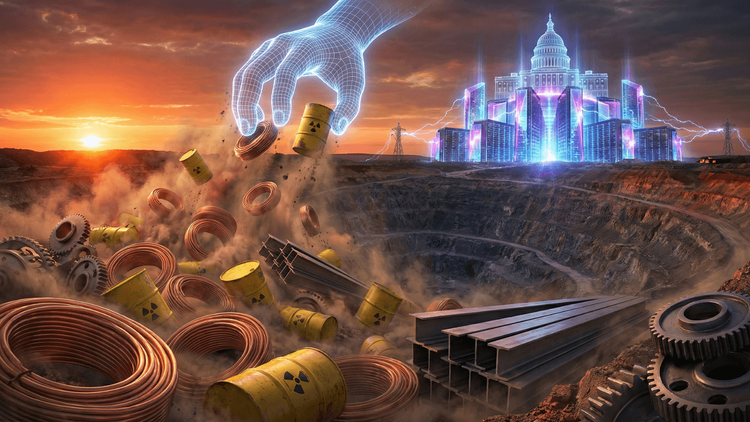UK Government Slashes Red Tape to Fast-Track Nuclear Power
Britain breaks decades of stagnation to supercharge nuclear energy, slashing red tape and unlocking billions in investment.

After decades of delay, Britain is finally taking decisive action to revive its nuclear energy sector. Prime Minister Keir Starmer has unveiled sweeping reforms designed to cut through red tape and accelerate the approval of new nuclear power plants across England and Wales. The move is part of his Plan for Change, a strategy aimed at boosting economic growth, enhancing energy security, and ensuring that clean, affordable power is available for future generations.
For too long, the UK has lagged behind in the global nuclear race. While China has constructed 29 new reactors and the European Union has 12 more in the pipeline, Britain has struggled to build even one since 1995. The industry, once a world leader, has been stifled by excessive regulations, with investment drying up as companies faced years of delays just to secure planning approval. That is now set to change.
Breaking the Barriers to Nuclear Expansion
The government’s reforms signal a radical shift in how nuclear projects are developed in the UK. For the first time, Small Modular Reactors (SMRs) will be included in planning rules, allowing these compact, cost-effective reactors to be built in key locations. Unlike traditional nuclear power stations, which take decades to complete, SMRs are faster and cheaper to construct, making them a game-changer for the UK’s energy future.
The government is also scrapping the outdated system that restricted nuclear development to just eight pre-approved sites. Instead, companies will have the freedom to propose new locations across England and Wales, encouraging more investment and ensuring that nuclear power can be deployed where it is needed most. By removing expiry dates on nuclear planning rules, the government is giving the industry the long-term stability it needs to plan, invest, and build.
A newly established Nuclear Regulatory Taskforce will oversee these changes, reporting directly to the Prime Minister. Its mission is to streamline the approval process, reduce unnecessary bureaucracy, and make Britain a more attractive destination for nuclear investment. These steps mark a clear rejection of the status quo, with the government determined to remove the barriers that have held back progress for too long.
Energy Security in an Uncertain World
This push for nuclear power is not just about economic growth—it is about energy security. The UK has been at the mercy of global energy markets for far too long. Russia’s invasion of Ukraine exposed the vulnerability of relying on imported fossil fuels, with gas prices skyrocketing overnight. Nuclear energy offers a stable, homegrown alternative that is immune to the political and economic turmoil of foreign markets.
The shift to nuclear will also support the UK’s growing technological infrastructure. The rise of AI, data centers, and supercomputing requires an enormous and consistent energy supply. Without reliable power, Britain risks falling behind in the global technology race. By embracing nuclear, the government is ensuring that industries dependent on high energy consumption—such as artificial intelligence—can thrive without being hampered by power shortages or soaring costs.
Industry Reactions: A Turning Point for Nuclear
The nuclear industry has responded positively to the reforms, viewing them as a long-overdue step in the right direction. Industry leaders have praised the government’s commitment to fast-tracking projects and providing the regulatory clarity needed to attract investment.
Simone Rossi, CEO of EDF UK, described the changes as a vital step in securing Britain’s energy future, emphasizing that a more efficient planning system will allow projects to move forward with confidence. Tom Greatrex, Chief Executive of the Nuclear Industry Association, called the announcement the strongest signal yet that new nuclear is essential for the UK’s clean power ambitions. GMB General Secretary Gary Smith echoed these sentiments, stressing that there can be no net zero without nuclear energy.
Experts agree that the ability to build nuclear plants faster and in more locations will unlock billions of pounds in investment, create thousands of jobs, and provide long-term price stability for consumers. Nuclear energy is no longer an option—it is a necessity.
A Future Built on Nuclear Power
The road ahead will not be without challenges. Even with regulatory changes, nuclear projects require massive investment, skilled labor, and long-term commitment. Speeding up reactor design approvals, ensuring efficient site selection, and maintaining the UK’s high safety standards will be crucial in making these reforms a success.
Britain now has a choice: remain stuck in a cycle of delays and rising energy costs, or embrace nuclear as the foundation of a secure and prosperous future. With the right execution, this plan could mark the beginning of a new era—one where the UK is no longer dependent on fossil fuel markets, but instead leads the way in clean, reliable, and affordable nuclear energy.






